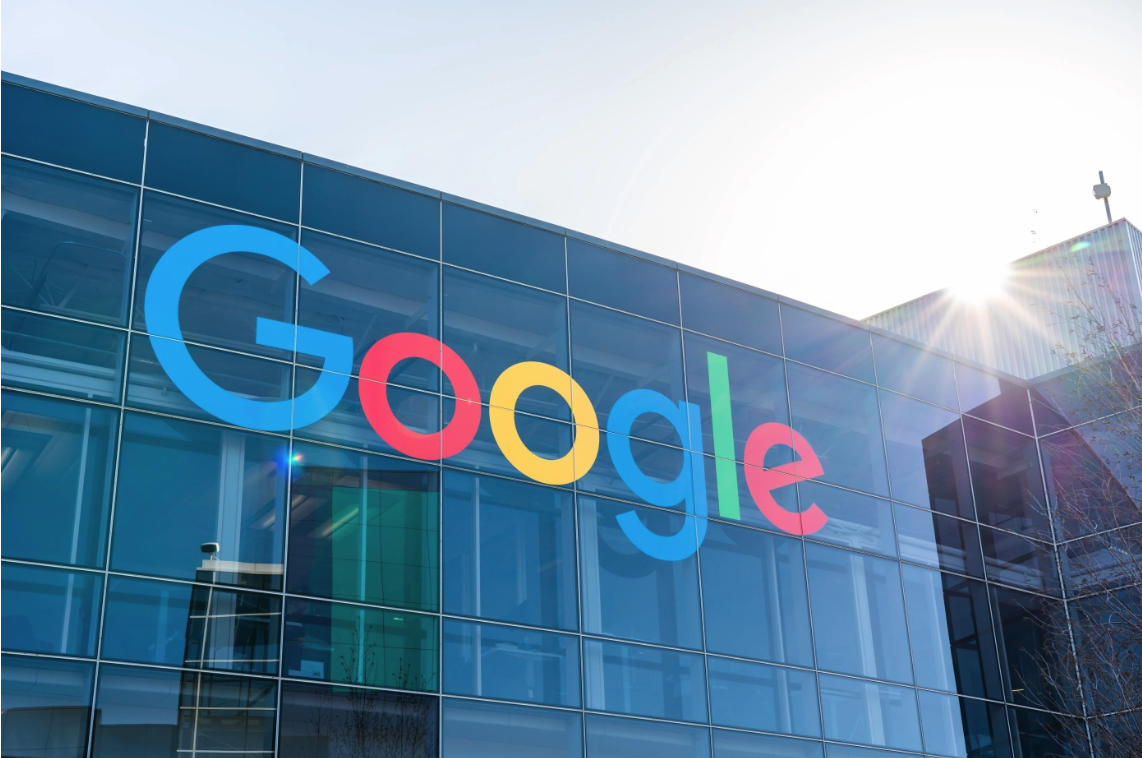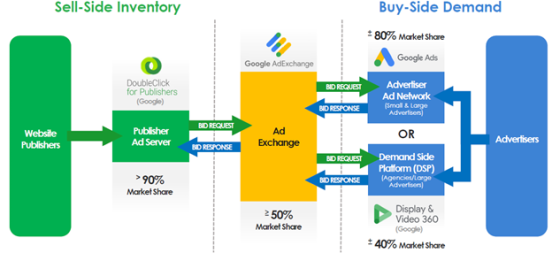Staff Report –
WASHINGTON, D.C. — The United States Department of Justice and eight states filed a civil antitrust lawsuit against Google on Tuesday for monopolizing multiple digital advertising technology products in violation of Sections 1 and 2 of the Sherman Act.
Filed in the U.S. District Court for the Eastern District of Virginia on behalf of the U.S. and Attorneys General of California, Colorado, Connecticut, New Jersey, New York, Rhode Island, Tennessee and Virginia, the complaint alleges that Google monopolizes key digital advertising technologies, collectively referred to as the “ad tech stack,” that website publishers depend on to sell ads and that advertisers rely on to buy ads and reach potential customers.
“Today’s complaint alleges that Google has used anticompetitive, exclusionary, and unlawful conduct to eliminate or severely diminish any threat to its dominance over digital advertising technologies,” Attorney General Merrick Garland said in the announcement. “No matter the industry and no matter the company, the Justice Department will vigorously enforce our antitrust laws to protect consumers, safeguard competition, and ensure economic fairness and opportunity for all.”
Website publishers use ad tech tools to generate advertising revenue that supports the creation and maintenance of a vibrant open web, providing the public with unprecedented access to ideas, artistic expression, information, goods and services. Through this monopolization lawsuit, the Justice Department and state Attorneys General seek to restore competition in these important markets and obtain equitable and monetary relief on behalf of the American public.
“The complaint filed today alleges a pervasive and systemic pattern of misconduct through which Google sought to consolidate market power and stave off free-market competition,” said Deputy Attorney General Lisa O. Monaco. “In pursuit of outsized profits, Google has caused great harm to online publishers and advertisers and American consumers. This lawsuit marks an important milestone in the Department’s efforts to hold big technology companies accountable for violations of the antitrust laws.”
As alleged in the complaint, according to a press release, over the past 15 years Google has engaged in a course of anticompetitive and exclusionary conduct that consisted of neutralizing or eliminating ad tech competitors through acquisitions. It wielded its dominance across digital advertising markets to force more publishers and advertisers to use its products, and thwarting the ability to use competing products.
In doing so, Google cemented its dominance in tools relied on by website publishers and online advertisers, as well as the digital advertising exchange that runs ad auctions.
“The Department’s landmark action against Google underscores our commitment to fighting the abuse of market power,” said Associate Attorney General Vanita Gupta. “We allege that Google has captured publishers’ revenue for its own profits and punished publishers who sought out alternatives. Those actions have weakened the free and open internet and increased advertising costs for businesses and for the United States government, including for our military.”
Google now controls the digital tool that nearly every major website publisher uses to sell ads on their websites (publisher ad server); it controls the dominant advertiser tool that helps millions of large and small advertisers buy ad inventory (advertiser ad network). And it controls the largest advertising exchange (ad exchange), a technology that runs real-time auctions to match buyers and sellers of online advertising.
“Today’s lawsuit seeks to hold Google to account for its longstanding monopolies in digital advertising technologies that content creators use to sell ads and advertisers use to buy ads on the open internet,” said Assistant Attorney General Jonathan Kanter of the Justice Department’s Antitrust Division. “Our complaint sets forth detailed allegations explaining how Google engaged in 15 years of sustained conduct that had — and continues to have — the effect of driving out rivals, diminishing competition, inflating advertising costs, reducing revenues for news publishers and content creators, snuffing out innovation, and harming the exchange of information and ideas in the public sphere.”
Google’s anticompetitive conduct has included:
Acquiring Competitors: Engaging in a pattern of acquisitions to obtain control over key digital advertising tools used by website publishers to sell advertising space.
Forcing Adoption of Google’s Tools: Locking in website publishers to its newly-acquired tools by restricting its unique, must-have advertiser demand to its ad exchange, and in turn, conditioning effective real-time access to its ad exchange on the use of its publisher ad server.
Distorting Auction Competition: Limiting real-time bidding on publisher inventory to its ad exchange, and impeding rival ad exchanges’ ability to compete on the same terms as Google’s ad exchange.
Auction Manipulation: Manipulating auction mechanics across several of its products to insulate Google from competition, deprive rivals of scale, and halt the rise of rival technologies.
As a result of its illegal monopoly, and by its own estimates, Google pockets on average more than 30 percent of the advertising dollars that flow through its digital advertising technology products. For some transactions and for certain publishers and advertisers, it takes far more.
Google’s anticompetitive conduct has suppressed alternative technologies, hindering their adoption by publishers, advertisers, and rivals.
The Sherman Act embodies America’s enduring commitment to the competitive process and economic liberty. For over a century, the Justice Department has enforced the antitrust laws against unlawful monopolists to unfetter markets and restore competition.
To redress Google’s anticompetitive conduct, the Department seeks both equitable relief on behalf of the American public as well as treble damages for losses sustained by federal government agencies that overpaid for web display advertising. This enforcement action marks the first monopolization case in approximately half a century in which the Department has sought damages for a civil antitrust violation.
Other Cases
In 2020, the Justice Department filed a civil antitrust suit against Google for monopolizing search and search advertising, which are different markets from the digital advertising technology markets at issue in the lawsuit filed today. The Google search litigation is scheduled for trial in September 2023.
Google is a limited liability company organized and existing under the laws of the State of Delaware, with a headquarters in Mountain View, California. Google’s global network business generated approximately $31.7 billion in revenues in 2021. Google is owned by Alphabet Inc., a publicly traded company incorporated and existing under the laws of the State of Delaware and headquartered in Mountain View, California.
This is the fifth antitrust lawsuit filed by U.S. officials against Google since 2020, as lawmakers and regulators around the world try to rein in the power that big tech companies exert over information and commerce online. In Europe, Amazon, Google, Apple and others have faced antitrust investigations and charges, while regulators have passed new laws to limit social media’s harms and some practices such as data collection.
In the United States, Meta, the parent company of Facebook and Instagram, was sued in 2020 over claims that it illegally crushed nascent rivals. Google has faced particular scrutiny. In 2020, a group of states led by Texas filed an antitrust lawsuit against it involving advertising technology, while the Justice Department and another group of states separately sued Google over claims that it abused its dominance over online search. In 2021, some states also sued over Google’s app store practices.
Google didn’t immediately respond to requests for comment.
The Biden administration is trying to use uncommon legal theories to clip the wings of some of America’s largest businesses, according to analysis by The New York Times.
The Federal Trade Commission has asked a judge to block Meta from buying a virtual-reality start-up, a rare case that argues a deal could harm potential competition in a nascent market. The agency has also challenged Microsoft’s $69 billion purchase of the video game publisher Activision Blizzard, a notable action because the two companies are not primarily seen as direct competitors.
The administration’s efforts are expected to meet fierce resistance in federal courts. Judges have for decades subscribed to a view that antitrust violations should mostly be determined by whether they increase prices for consumers. But Jonathan Kanter, the chief of the Justice Department’s antitrust division, and Lina Khan, the F.T.C. chair, have said they are willing to lose cases that allow them to stretch the boundaries of the law and that put corporate America on notice.
Google has been a force in online advertising for decades. Its $3.1 billion purchase in 2007 of DoubleClick, a maker of popular ad tools, amplified the reach of its already powerful digital advertising machine. DoubleClick gave Google a crucial role on the rest of the internet, providing a marketplace for publishers and letting Google host more ads on sites across the web.
At the time, Google had $16.6 billion in annual revenue, primarily from its search engine business. By 2021, the company’s advertising technology division generated $31.7 billion in revenue, making it the second-largest business unit after the flagship search engine. Through the first three quarters of 2022, the unit posted $24.3 billion in sales.
Google has long faced accusations from online publishers that its control over the digital ads ecosystem unfairly sapped profits from the sites where the ads are displayed.
One group representing publishers, including The New York Times Company, has pushed Congress to allow the sites to negotiate the terms of ad deals collectively with Google and other online platforms. Normally, that kind of coordination would be illegal under antitrust laws. The publishers’ efforts have been unsuccessful so far.
On Friday, Google announced that it would lay off 12,000 employees, or 6 percent of its work force, in response to a slowdown in the digital advertising market. The company said the cuts would allow it to prioritize projects involving artificial intelligence, an area that has picked up steam in Silicon Valley in recent months.
___
If you support truth in reporting with no paywall, and fearless writing with no popup ads or sponsored content, consider making a contribution today with GoFundMe or Patreon or PayPal.















